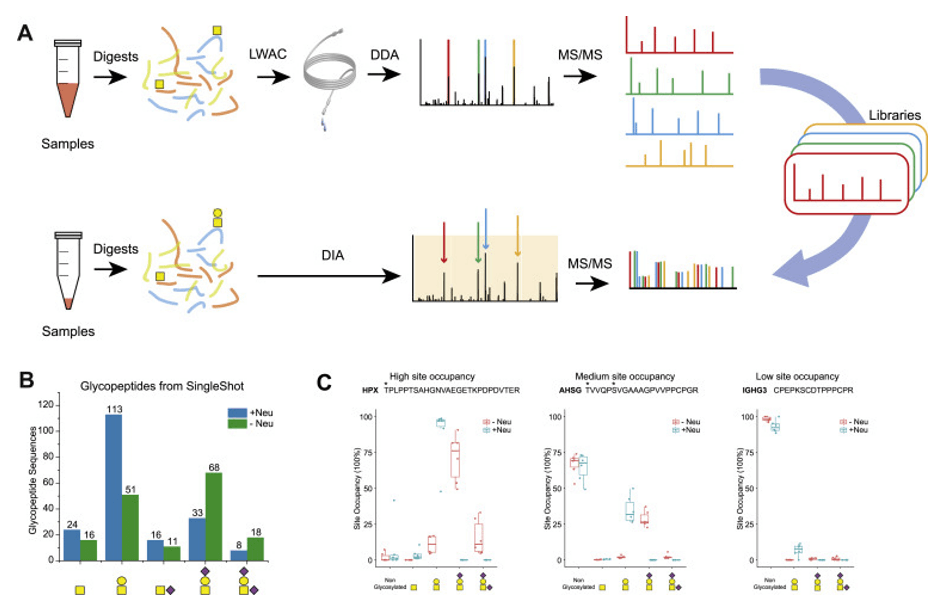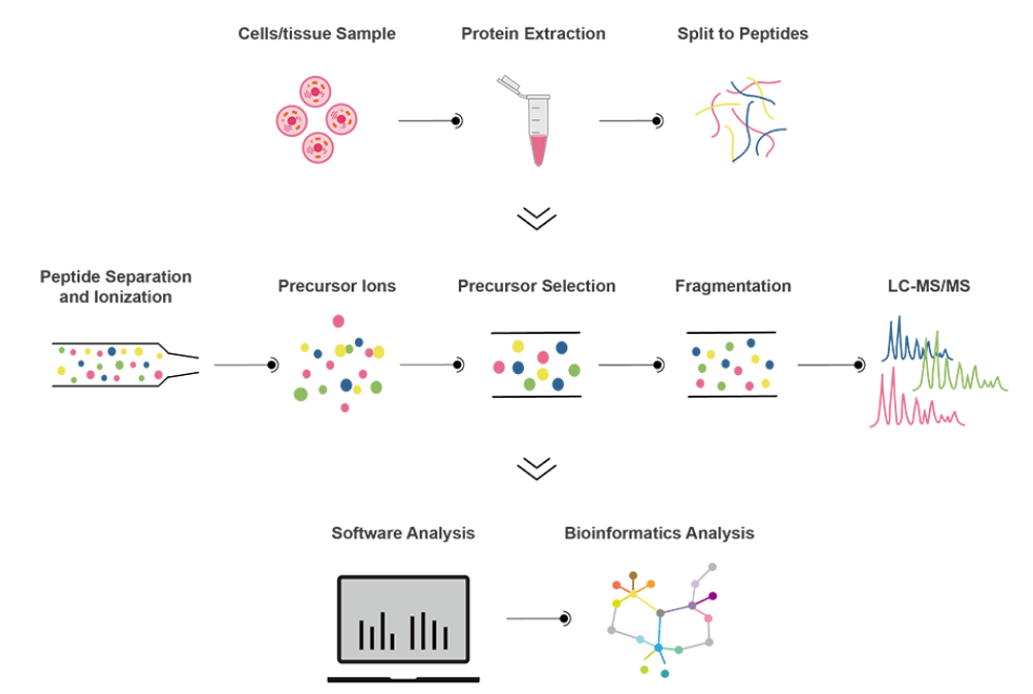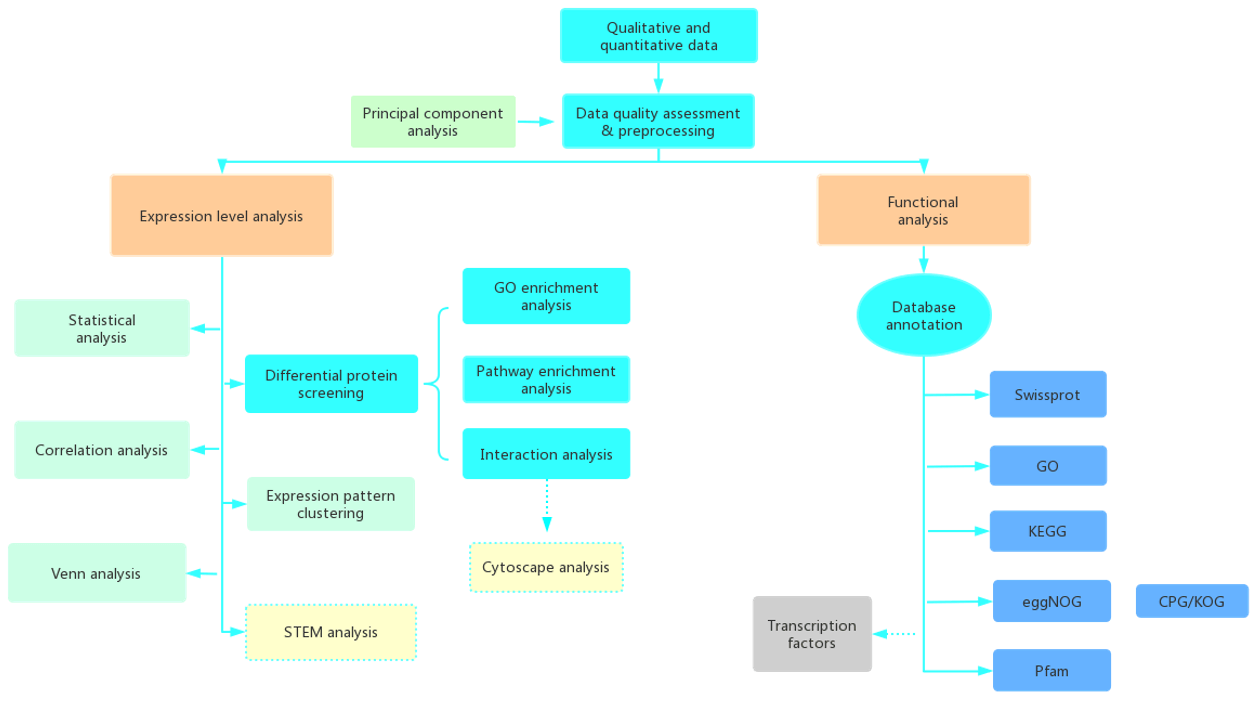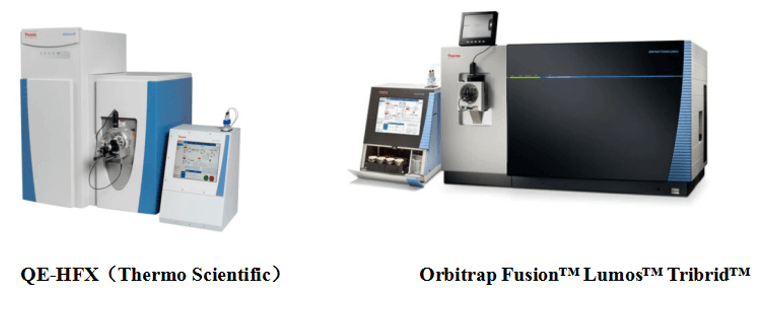DIA-Based Glycoproteomics Services
The Challenges of Protein Glycosylation Analysis
Glycosylation is a complex post-translational modification that is critical for regulating the functions of diverse proteins. Glycoproteomics is the subfield of proteomics that focuses on protein glycosylation. Glycans pose a challenge to proteomic analysis because the mass of the glycopeptide varies according to the composition of the glycan, which is naturally heterogeneous. Glycopeptides are usually separated together with a large number of non-glycosylated peptides. Due to such high complexity, glycopeptide ions are either low in content or heavily suppressed, thus requiring the identification of specific analytical techniques.
The Methods of Glycoproteomics Analysis
Although no single method can solve all the problems in glycoproteomics, data independent acquisition-based MS (DIA-MS) has proven to be powerful and attractive in various experimental setups and is now starting to be applied in the field of glycoproteomics.
Mass spectrometry (MS) proteomics is an analytical technique to identify and quantitate peptides or proteins and their post-translational modifications (PTMs). In MS proteomics, the peptides or proteins are fragmented and ionized, and ions are separated according to their mass-to-charge (m/z) ratio and detected with appropriate equipment. By comparing the observed m/z values for each ion detected with predicted m/z values calculated from known biological information, the peptides and proteins in the sample can be identified.
DIA is currently an emerging approach in bottom-up proteomics that enables deep proteome coverage and accurate label-free quantification. DIA-based MS can solve some of the major problems of DDA-based glycopeptidomics and significantly increase the number of identified glycopeptides, especially in cases where glycopeptides represent only a small fraction of the total peptide pool. DIA-based methods also allow more efficient estimation of glycosylation site occupancy and heterogeneity. The benefits of DIA, including a broader dynamic range, improved reproducibility, and accurate quantification, provide unique support for effective PTM analysis.
 Overview of the Glyco-DIA strategy. (Zilu Ye, and Sergey Y. Vakhrushev.2021)
Overview of the Glyco-DIA strategy. (Zilu Ye, and Sergey Y. Vakhrushev.2021)
Our DIA-based Glycoproteomics Services
Utilizing discovery proteomics and targeted proteomics platforms, Creative Proteomics offers a large-scale glycoproteomics analysis service package. All you need to do is to send us your samples and we will take care of all the follow-ups of your project, including protein extraction, proteolysis, peptide separation, mass spectrometry analysis, mass spectrometry raw data analysis, and bioinformatics analysis.
Our next-generation proteomics services, based on DIA MS technology can detect glycosylation on a large scale from complex biological samples or absolute quantitative specific proteins to provide a comprehensive overview of signaling events and pathway activity regulation.
Workflow

Data Analysis

Sample Requirements
- Animal and clinical tissue specimens: 200mg/sample
- Serum, plasma: 200μL/sample
- Cells, microorganisms: 1×107cells/sample
- Plant tender leaves and buds: 500mg/sample
- Plant seeds, fruits: 100mg/sample
Detection Platforms

Our Glycoproteomics Profiling Services Include
- Enzyme digestion
- Plasma/serum protein depletion
- Peptide fractionation
- Peptide purification and concentration
- Quality control runs
- LC-MS/MS analysis (DDA mode)
- Database search
Advantages
- Various enrichment methods for glycan moieties
- High sensitivity
- High accuracy
- High repetition rate
- High throughput
- Complete and comprehensive data analysis and presentation
Report
- Experimental steps
- Relevant experiment parameters
- Mass spectrometry pictures
- Raw data
- Proteomics analysis results
References:
- Stephen G. Oliver Juan I. Castrillo. Yeast Systems Biolo.191-193 (2019)
- Zilu Ye, and Sergey Y. Vakhrushev. The Role of Data-Independent Acquisition for Glycoproteomics. Mol Cell Proteomics. 20 (2021)


 4D Proteomics with Data-Independent Acquisition (DIA)
4D Proteomics with Data-Independent Acquisition (DIA)